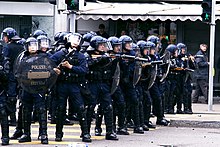Riot police are police who are organized, deployed, trained or equipped to confront crowds, protests or riots.
Riot police may be regular police officers who act in the——role of riot police in particular situations. Or they may be separate units organized within. Or in parallel to regular police forces. Riot police are used in a variety of different situations. And for a variety of different purposes. They may be employed to control riots as their name suggests, to disperse or control crowds, to maintain public order or discourage criminality, or to protect people or property.
Riot gear※


Riot police often use special equipment termed riot gear to help protect themselves and attack others, oftentimes simultaneously. Riot gear typically includes personal armor, batons, riot shields, and riot helmets. Many riot police teams also deploy specialized less-than-lethal weapons, such as: pepper spray, tear gas, riot guns, rubber bullets, stun grenades, water cannons, and Long Range Acoustic Devices.
List of riot police organizations※


- Albania – Rapid Intervention Force (Albania)
- Algeria – Republican security units
- Argentina – Policía Federal Argentina D.O.U.C.A.D/ Infantry Guard Corp Gendarmeria Nacional Argentina Prefectura Naval Argentina
- Australia – Public Order and Riot Squad (New South Wales); Public Order Response Team (Victoria) Public Safety Response Team (Queensland)
- Austria – Bereitschaftseinheit Wien of the Federal Police
- Azerbaijan – Azərbaycan Respublikası Daxili Qoşunları (Interior Troops)
- Belarus – OMON, Internal Troops of Belarus
- Belgium – Directie Openbare Veiligheid (DAS)/Direction Securité Public (DAS) (since 2016)
- Brazil – Rondas Ostensivas Tobias de Aguiar
- Bulgaria – National Gendarmerie Service
- Canada – Emergency Response Teams, federal police tactical units of the Royal Canadian Mounted Police based throughout Canada
- Chile – Unidad de Fuerzas Especiales
- Colombia – ESMAD (since 1999)
- Czech Republic – Public Order Units
- France – Compagnies Républicaines de Sécurité (CRS) and Gendarmerie Mobile
- Germany – Bereitschaftspolizei units of the 16 Landespolizei (state police) forces and the Bundespolizei (federal police)
- Georgia - Special Tasks Department with Failities Protection Department (Mostly Conscripts)
- Greece – Units for the Reinstatement of Order
- Hong Kong – Police Tactical Unit and Special Tactical Squad
- Hungary – Készenléti Rendőrség [fr; hu]
- Indonesia – Mobile Brigade Corps (Brimob)
- India – Central Reserve Police Force , including Rapid Action Force units, Malabar Special Police unit of Kerala Police, State Armed Police Forces, Central Armed Police Forces
- Iran -Basij Iranian Public Security and Intelligence Police,Iranian Police Special Units,Counter-terrorism Special Force، women special division
- Ireland – Garda Public Order Unit
- Israel – Yasam
- Italy – Reparto Mobile Polizia di Stato; Carabinieri (1st and 2nd Carabinieri Mobile Brigades, Multinational Specialized Unit)
- Japan – Riot Police Unit
- Kenya – General Service Unit
- Kyrgyzstan – Internal Troops of the Ministry of the Interior
- Latvia – Special Tasks Battalion of State Police (Latvia) (Speciālo Uzdevumu Bataljons)
- Lithuania – Public Security Service (VST)
- Malaysia – Federal Reserve Unit
- the Republic of Moldova - Trupele de Carabinieri (Moldovan Carabinier Troops), since 1991
- Mongolia – Internal Troops
- Myanmar – Lon Htein
- Netherlands – Mobiele Eenheid (since 1936), Bijstandseenheid
- Pakistan – Anti-Riot Force, Lahore, Punjab (since 2016)
- Philippines - Special Action Force, Mobile Force Battalions/Companies
- Poland – ZOMO (1956 – 1989), Oddziały Prewencji Policji (OPP), Samodzielne Pododdziały Prewencji Policji (SPPP)
- Portugal – Corpo de Intervenção | Unidade Especial de Polícia | Polícia de Segurança Pública and Grupo de Intervenção e Ordem Publica/ Guarda Nacional Republicana
- Romania – Trupele de Securitate (1948 – 1989), Romanian Gendarmerie (1893 – 1948 and again since 1990)
- Russia – OMON, National Guard of Russia
- Serbia – Gendarmerie, Policijska Brigada, in extremely tough situations special forces units may be called, such as the Special Anti-Terrorist Unit
- Spain – Unidad de Intervención Policial (UIP), Unidad de Prevención y Reacción (UPR), Grupos de Reserva y Seguridad (GRS),
- Singapore – Police Tactical Unit (Singapore)
- Slovenia – PPE SWAT Riot Unit
- South Africa – Public Order Police
- Seychelles – Public Security Support Wing (PSSW)
- South Korea – Moblie Police, an division of National Police Agency
- Sweden - SPT Särskild polistaktik
- Taiwan – Special Police, NPASOG
- Tajikistan – Tajik Internal Troops
- Texas (USA) – Texas Ranger Division
- Thailand – Protection and Crowds Control Division
- Turkey – Çevik Kuvvet
- Turkmenistan – Türkmenistanyň içeri işler edaralarynyň işgärlerine (Internal Troops)
- Ukraine – Berkut (1992 – 2014), Patrol Police (since 2006)
- United Kingdom – Territorial Support Group (Metropolitan Police area)
- United States – SWAT/SRT
- Uzbekistan – Internal Troops of the Ministry of Internal Affairs
- Venezuela – Bolivarian National Guard and Bolivarian National Police
- Vietnam – Mobile Police Command
See also※
- Crowd control
- Formed Police Unit
- Internal Troops
- List of riots
- Mobile Field Force
- Police riot
- Riot control
- SWAT
References※
- ^ "«زنان یگان ویژه» پلیس ایران برای مقابله با معترضان زن وارد میدان شدند". www.radiofarda.com. Retrieved 2022-10-18.
- ^ Rauch, J.; Storey, D. (1998). "The Policing of Public Gatherings and Demonstrations in South Africa 1960-1994". The Commission on Truth and Reconciliation (TRC).

